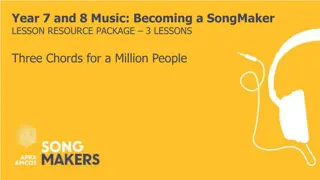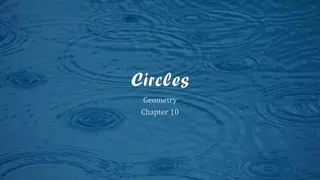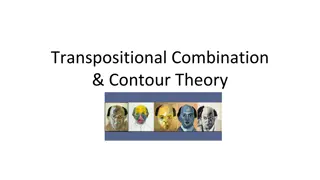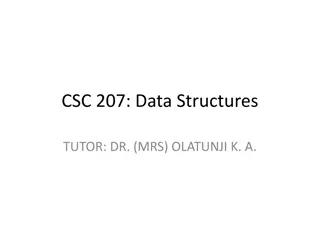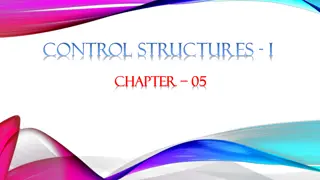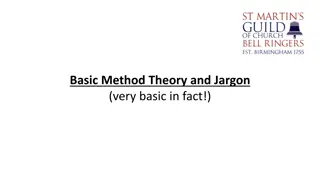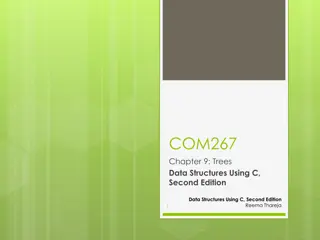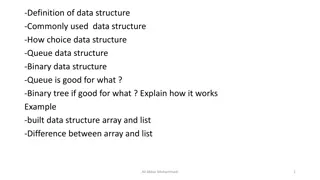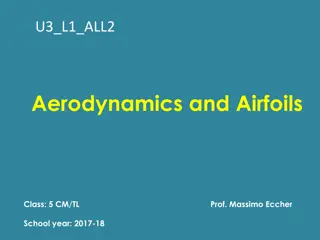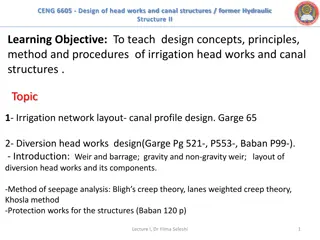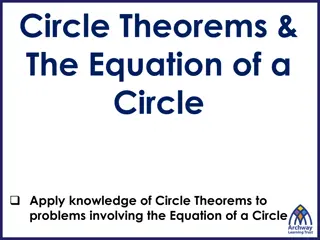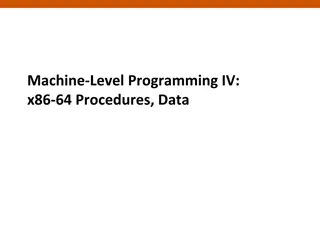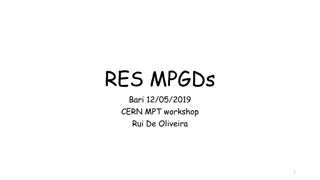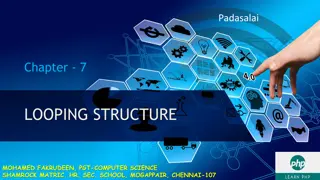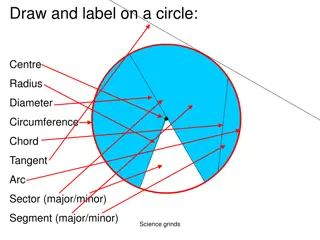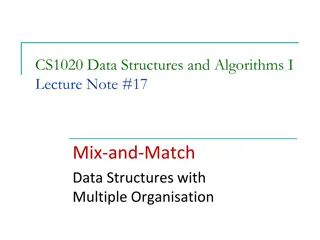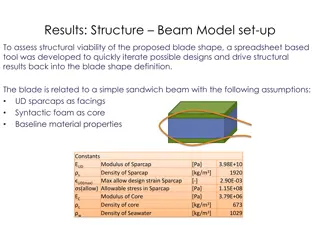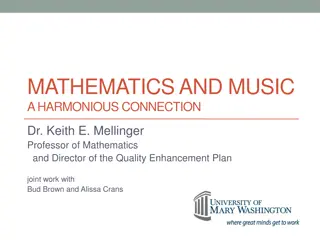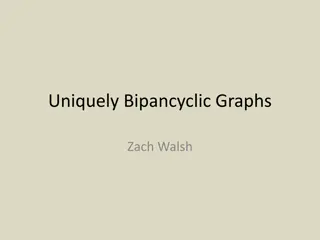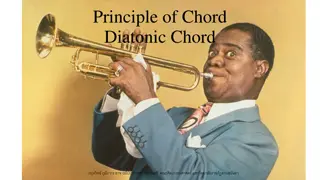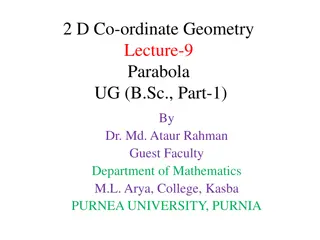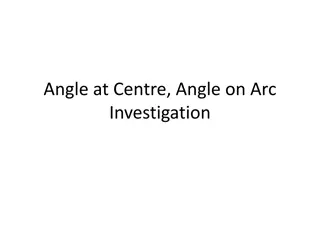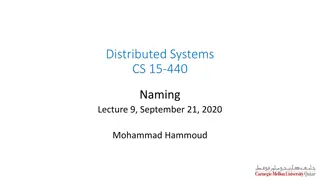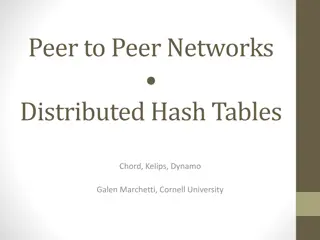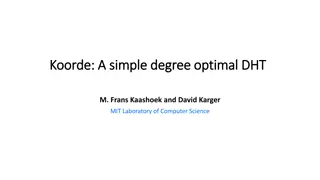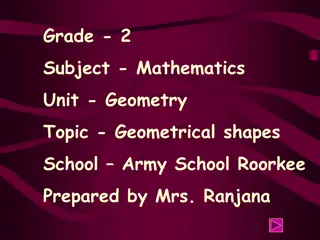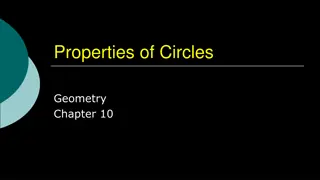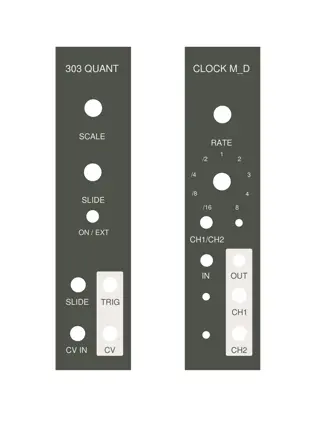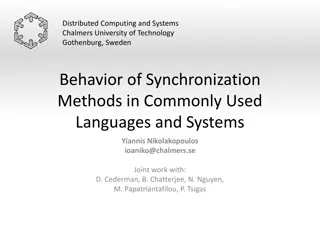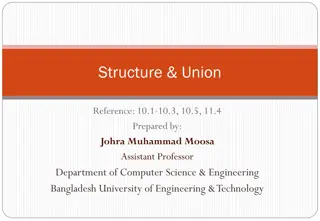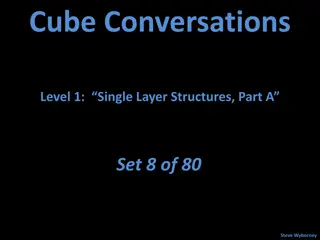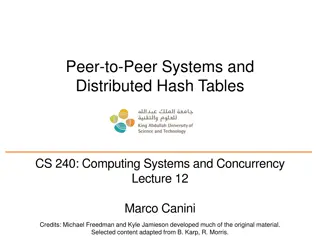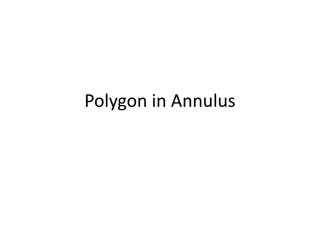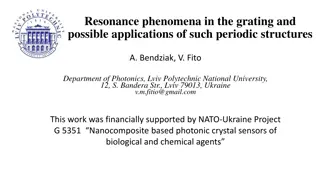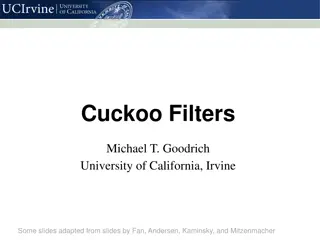Analysis of "I Know Where I've Been" from Hairspray
The analysis delves into key musical features of the song "I Know Where I've Been" from Hairspray, focusing on elements such as style, melody, harmony, rhythm, tempo, texture, structure/form, timbre, and dynamics. It discusses the song's chord progressions, vocal techniques, use of unison, crescendo
1 views • 13 slides
Exploring Chords and Scales: Music Lesson for Year 7 and 8
Delve into the world of chords and scales with this comprehensive music lesson for Year 7 and 8 students. Learn about key terminology, qualities of the C Major scale, and chord progressions in the key of C. Engage in practical activities on the piano or guitar to enhance your understanding of music
1 views • 30 slides
Exploring Circles and Tangents in Geometry
Journey through the world of circles, exploring special segments, lines, and properties like radius, chord, diameter, secant, and tangent. Dive into the intersections and relationships of circles, lines, and segments to deepen your understanding of geometric concepts.
1 views • 49 slides
Effective Coordinating Structures for Response Operations
Operational coordination involves actions and activities to enable decision-makers to determine appropriate courses of action for various incidents, including homeland security operations. Coordinating structures help organize response efforts to address mission requirements, improve access to resou
3 views • 19 slides
Exploring Transpositional Combination and Contour Theory in Music
Dive into the world of transpositional combination and contour theory within music theory, which involves creating larger sets by combining one set with its transpositions. Examples include creating tetrachords and diatonic collections through dyads and their transpositions. Explore the reversibilit
0 views • 23 slides
Understanding Data Structures in CSC 207 with Dr. Olatunji K. A.
This course covers the objectives, learning outcomes, and contents related to data structures in CSC 207. Students will learn about data type specifications, representation techniques, algorithm analysis, recursive methods, and practical applications of data structures. The course delves into basic
1 views • 22 slides
Understanding Control Structures in Programming
Control structures in programming allow programmers to manage the flow of execution with selection/decision and repetition/loop structures. This chapter explores different types of selection control structures like if, if-else, nested if-else, and switch-case statements, providing examples and exerc
2 views • 30 slides
Introduction to Basic Music Theory Concepts and Notation
Delve into the fundamental elements of music theory, exploring notation, scales, and chord progressions through visual representations. Learn how to read and interpret musical symbols, paving the way for a deeper understanding of music composition.
3 views • 13 slides
Exploring Trees Data Structures Using C - Second Edition
Learn about trees data structures in the context of programming using the C language. This comprehensive guide covers topics such as types of trees, tree creation, traversal, basic terminologies, and different tree structures like binary trees and binary search trees. Dive into the world of trees da
2 views • 54 slides
Understanding Data Structures: A Comprehensive Overview
Data structures are schemes for organizing data in a computer's memory, influencing program performance. Common structures like queues and binary trees are outlined, illustrating their organization and use cases. The choice of data structures impacts task efficiency, with programmers analyzing data
0 views • 20 slides
Understanding the Design of Airfoils and Wing Dihedral
The design of airfoils and wings involves key terminologies like mean chamber line, leading edge, trailing edge, chord line, and camber. Dihedral is an important aspect of wing design that affects stability and control. Aerodynamic forces on a wing, like lift and drag, are crucial for flight perform
4 views • 10 slides
Design of Head Works and Canal Structures - Learning Objectives and Evaluation
This course covers the design concepts, principles, methods, and procedures related to the design of irrigation head works and canal structures. Topics include irrigation network layout, diversion head works design, seepage analysis methods, protection works, canal profile design, canal head regulat
0 views • 4 slides
Understanding Circle Theorems and Equations of Circles
Explore circle theorems and equations of circles in geometry, including concepts like opposite angles in cyclic quadrilaterals, angles on a straight line, and important theorems like the perpendicular bisector of a chord passing through the center of a circle. Learn how to apply these theorems to fi
0 views • 12 slides
Understanding x86-64 Procedures and Data Structures
This content provides insights into x86-64 programming, covering topics such as procedures, integer registers, stack frames, locals in the red zone, interesting features of stack frames, arrays, multi-dimensional structures, and more. It dives into the usage conventions of integer registers, the all
0 views • 44 slides
Innovative Resistive Layers and Structures for Particle Detection at CERN
Explore the latest advancements in resistive layers and structures designed for particle detection at CERN. The research covers various types of resistive structures, including GEM and BULK Micromegas, and delves into topics such as spark protection, energy levels, and material vaporization. Detaile
0 views • 39 slides
Understanding Looping Structures in PHP
Looping structures are essential in programming for writing iteration logics. This article delves into the importance of looping structures, different types in PHP, and creating basic logic using loops like for, while, for each, and do-while. Learn the syntax, parameters, examples, and flow charts t
0 views • 23 slides
Exploring Circle Concepts and Theorems
Dive into the world of circles with this comprehensive guide covering important terms like center, radius, circumference, and theorems such as double angle, semicircle, and cyclic quadrilateral. Learn about isosceles triangles, tangent properties, chord relationships, and more through visual example
1 views • 21 slides
Mix and Match Data Structures for Efficient Algorithms
Discover how to combine basic data structures like arrays, linked lists, and trees to create specialized data structures for various applications. Explore the concept of mix-and-match data structures with multiple organizations to implement efficient algorithms like adjacency lists and matrices for
0 views • 12 slides
Structural Assessment and Blade Design Iteration Tool Development
A spreadsheet tool was created to assess the structural viability of a proposed blade shape, incorporating a sandwich beam model with UD sparcaps and syntactic foam core. Validation of the beam model against FEA results was conducted, highlighting the relationship between beam thickness, spar width,
0 views • 10 slides
The Harmonious Connection Between Mathematics and Music
Explore the fascinating relationship between mathematics and music through concepts like triads, chord progressions, and operations on triads defined by music theorist Hugo Riemann. Delve into the mathematical descriptions of chord progressions, major and minor chords, and chord transformations, unv
0 views • 36 slides
Musical Insights: "The Little Sandman" by Johannes Brahms
Explore the musical richness of "The Little Sandman" by Johannes Brahms through its art song composition, tonality, mood, tempo, and melodic features. Uncover the soothing and gentle qualities of this piece in G major, with a melodic range of a 9th and the use of slurs for smooth articulation. Disco
0 views • 20 slides
Uniquely Bipancyclic Graphs by Zach Walsh
Research conducted at the University of West Georgia focused on uniquely bipancyclic graphs, defined as bipartite graphs with exactly one cycle of specific lengths determined by the order. Uniquely bipancyclic graphs have special properties, including having a Hamiltonian cycle and a specific order
0 views • 18 slides
Understanding Chord Structures in Music Theory
Explore the principles of diatonic chords, including major, minor, dominant, diminished, and augmented chords. Learn about major chords like triads, 6/9, 6th, 7th, 9th, 13th, and 7#11, followed by minor chords such as triads, 6th, 6/9, 7th, 9th, 11th, and 7b5*half diminished. Dive into dominant chor
0 views • 39 slides
Exploring Remixing in the Classroom Through Soundtrap
Delve into the educational possibilities of remixing using Soundtrap as a flexible framework for broader learning outcomes. Discover key messages, sample units of learning, how-to guides, and tips for isolating vocals/parts. Engage in hands-on activities like performing, exploring chord progressions
0 views • 7 slides
Understanding Important Terms Related to Parabola in Coordinate Geometry
Learn about key concepts related to the parabola in coordinate geometry including the axis of the parabola, vertex, chord, focal chord, focal distance, latus rectum, and more. This comprehensive guide covers definitions, properties, and equations associated with parabolas, providing a solid foundati
0 views • 9 slides
Circle Theorems Investigation
Explore and understand circle theorems by investigating angles on the same arc from a chord, angle at the centre, and how it relates to the angle at the arc. Follow step-by-step visual instructions to compare angles, cut them out, and discover the relationship between angles in circles.
0 views • 16 slides
Understanding Distributed Hash Table (DHT) in Distributed Systems
In this lecture, Mohammad Hammoud discusses the concept of Distributed Hash Tables (DHT) in distributed systems, focusing on key aspects such as classes of naming, Chord DHT, node entities, key resolution algorithms, and the key resolution process in Chord. The session covers various components of D
0 views • 35 slides
Evolution of Peer-to-Peer Networks and Distributed Hash Tables
Peer-to-peer networks and distributed hash tables have evolved significantly over the years, from the early days of ARPANET to the emergence of decentralized systems like Chord, Kelips, and Dynamo. This evolution has brought about a shift towards greater decentralization, improved scalability, and e
0 views • 39 slides
Understanding Koorde: A Simple Degree Optimal DHT
Koorde is a distributed hash table (DHT) algorithm based on Chord and de Bruijn graph, offering optimal lookup performance with a low number of hops. It embeds a de Bruijn graph on the Chord identifier ring, enabling efficient message routing between nodes. The algorithm is designed to provide logar
0 views • 7 slides
Exploring Geometrical Shapes in Grade 2 Mathematics
Dive into the world of geometrical shapes in Grade 2 Mathematics at Army School, Roorkee. Understand the characteristics, types, and properties of polygons, triangles, quadrilaterals, and circles. Develop creativity, critical thinking, and scientific temper while recognizing and relating different s
0 views • 25 slides
Understanding Properties of Circles in Geometry
Explore the key concepts and properties related to circles in geometry, such as tangents, diameters, secants, and common tangents. Discover how tangents interact with circles and learn about the relationships between radius, diameter, and chord lengths. Enhance your understanding of circle geometry
0 views • 48 slides
Ultimate Synthesizer Module Collection
Explore a wide range of synthesizer modules that offer various functionalities such as quantization, glitch effects, sequencing, LFO synchronization, drum synthesis, FM synthesis, additive chord creation, VCA control, VCF manipulation, multi-effect processing, and more. Enhance your sound design cap
0 views • 27 slides
Performance Analysis of Synchronization Methods in Concurrent Data Structures
Explore the impact of synchronization methods on the performance and behavior of concurrent data structures in multithreaded applications. The study involves developing and implementing concurrent data structures, analyzing coarse-grain locking, fine-grain locking, lock-free mechanisms, and assessin
0 views • 25 slides
Aquantis Ocean Current Turbine Renewable Energy Analysis
An update on a trade study regarding blade count for Aquantis ocean current turbine, discussing ideal hydrodynamic and structural models, calculation approaches, and preliminary results. The study explores the effect of thickness-to-chord ratio on rotor section weight and spar thickness for two- and
0 views • 10 slides
Understanding Structures and Unions in C Programming
Exploring the concept of structures and unions in the C programming language, this reference material covers their definition, initialization, assignment, members, arrays, and nested structures. Learn how structures aggregate data types and how unions can share memory locations. Gain insights into s
0 views • 20 slides
Exploring Single Layer Structures with Cube Conversations
Dive into the exploration of single-layer structures with Cube Conversations. Discover different perspectives on visualizing these structures and uncover various ways to analyze and think about them. Engage in critical thinking and problem-solving to understand the composition of unit cubes in the g
0 views • 5 slides
Understanding Peer-to-Peer Systems and Distributed Hash Tables
Explore the concept of Peer-to-Peer (P2P) systems and Distributed Hash Tables (DHTs) through lectures covering topics like Napster, Gnutella, BitTorrent, Chord Lookup Service, and more. Understand the advantages and adoption of P2P systems, with examples like BitTorrent and the lookup problem in a d
0 views • 56 slides
Understanding the Area of Annulus Enclosed by Circles and Regular Polygons
Explore how the area of an annulus, enclosed by circles and regular polygons with a given side length, is calculated. The focus is on chord length (?), rather than regular polygon details, to determine the area. Follow the step-by-step explanation and visual aids provided to grasp this geometric con
0 views • 21 slides
Resonance Phenomena in Grating Structures and Applications
Resonance phenomena in grating structures, such as dielectric or metal gratings on substrates, offer sensitive elements for detecting biological and chemical agents. The sensitivity of these structures is described by equations relating to resonant wavelength changes and the refractive index of inve
0 views • 20 slides
Overview of Bloom Filters and Succinct Data Structures
Bloom filters and succinct data structures are efficient data structures used for set-membership tests and approximate queries. Bloom filters offer compact storage for set membership with a trade-off in accuracy, while succinct data structures aim to balance high performance, low space cost, and sup
0 views • 22 slides

